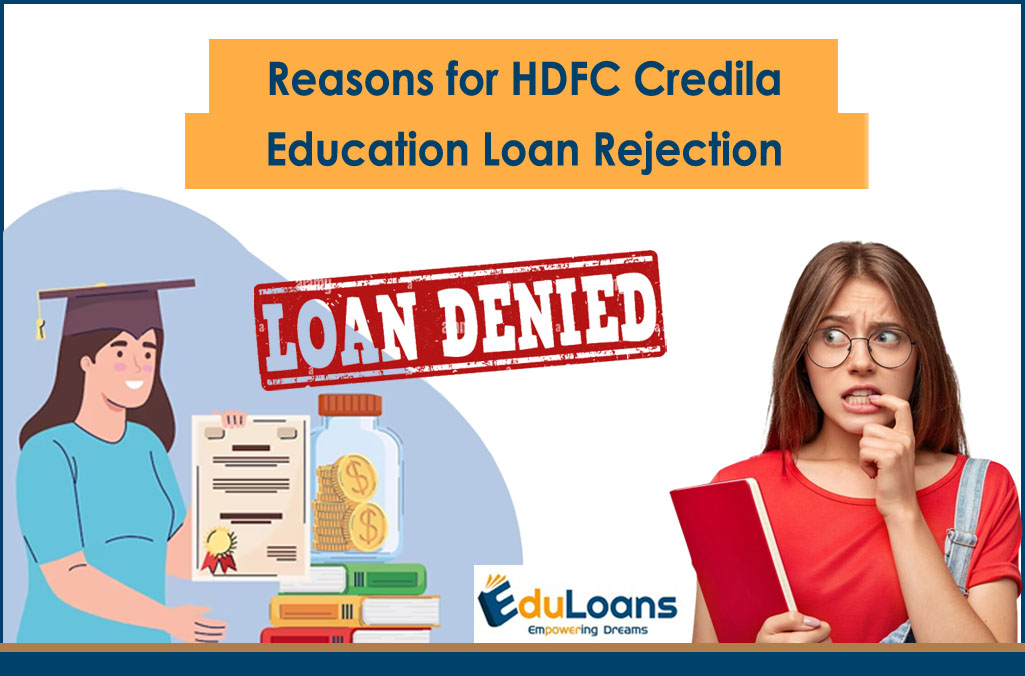Reasons for HDFC Credila Education Loan Rejection
Higher education is pivotal in shaping one’s career in today’s competitive world. Many students aspire to pursue their dream courses and build a successful future. HDFC Credila, a prominent financial institution, offers study-abroad education loans to support these ambitions. However, there are instances where education loan applications face rejection. This article delves into the HDFC Credila loan denial reasons, shedding light on factors essential for overseas education loans to help you finance your ambitions in no time!
Loan Rejection Reasons
Overseas Education Loans – HDFC Credila is long known for its assistance in turning aspirations into dream institutions. However, carefully considering the reasons behind education loan rejection is of utmost importance. Understanding these rejection factors can avoid unnecessary setbacks, save time, and increase their chances of securing the education loan they need to pursue their academic aspirations! Here is what you need to take note of—
1. Low CIBIL Score
A healthy CIBIL score is a critical factor in loan approval processes. It reflects an individual’s creditworthiness and financial responsibility. A low CIBIL score, often caused by missed payments or defaults, can raise concerns for lenders. HDFC Credila, like other financial institutions, considers the applicant’s credit history to assess their ability to repay the loan. A low score might lead to rejection or higher interest rates.
2. Academic Performance and Loan Eligibility
While a strong academic record is not the sole determinant for an education loan, it does influence the lender’s decision. HDFC Credila might consider the applicant’s educational background and performance to ensure that the chosen course aligns with their academic trajectory. Poor academic performance or choosing a course unrelated to previous studies might lead to rejection.
3. Age Limit of the Applicant
Age is another factor that HDFC Credila assesses when evaluating education loan applications. Applicants should fall within the specified age bracket to qualify for the loan. If an applicant’s age exceeds the defined limit, their application could be rejected. This criterion ensures borrowers have sufficient time to repay the loan before retirement.
4. Course Applied for Higher Education
The course of study greatly influences the loan approval process. HDFC Credila might scrutinise whether the chosen course holds promise for future employment and income generation. Opting for a course with limited career prospects might raise concerns about the applicant’s ability to repay the loan, resulting in rejection.
5. Financial Income of the Co-applicant
Education loans often require a co-applicant, a parent or guardian, who will be equally responsible for repayment. The co-applicants financial stability and income play a significant role in the decision-making process. If the co-applicants income is inadequate to support the loan, HDFC Credila might reject the application to prevent potential repayment difficulties.
Turn Setbacks into Success with Eduloans!
Applicants must understand these considerations and address potential concerns before applying for an education loan. By maintaining a good credit score, focusing on academic excellence, choosing a viable course, and ensuring the co-applicants financial capability, aspiring students can enhance their chances of securing an education loan successfully.
Eduloans is your trusted partner in realising educational aspirations. With expert guidance, we navigate the complexities of education loans, enhancing approval prospects. Secure your academic journey today. Call us for personalised assistance and support!
